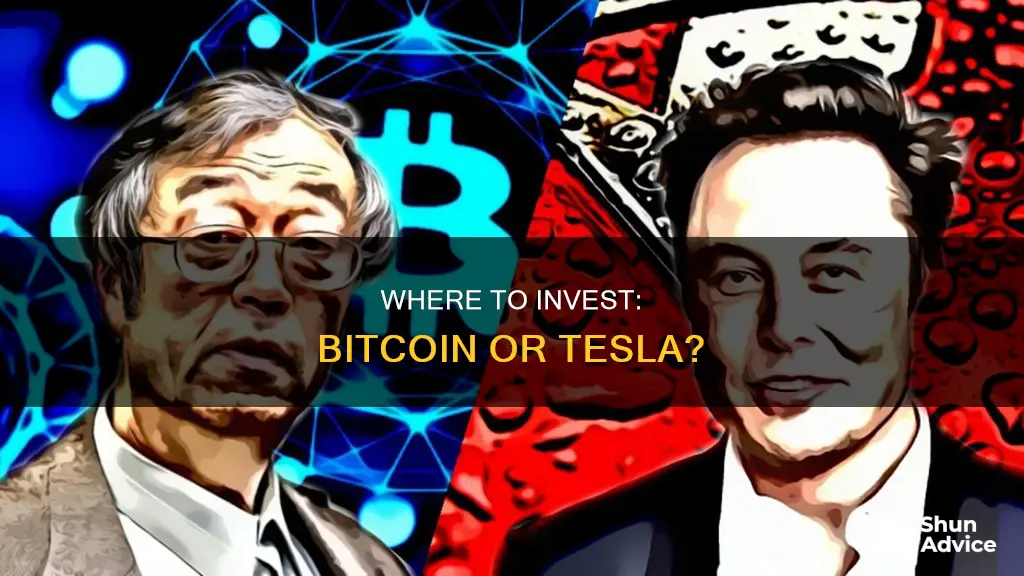
Tesla's $1.5 billion investment in Bitcoin has sparked interest in the potential of the cryptocurrency as an alternative investment to traditional stocks. As one of the biggest companies to have made this move, Tesla's decision to accept Bitcoin as payment for its products and hold it as a store of value has contributed to the rising price of Bitcoin. This has resulted in gains for the company, with its Bitcoin holdings reaching nearly $2 billion by the end of 2021. However, the volatility of Bitcoin's price and the environmental impact of Bitcoin mining have also raised concerns, leading Tesla to suspend vehicle purchases using Bitcoin. With the growing institutional adoption of cryptocurrencies and Tesla's influential role in the market, the question of whether to invest in Bitcoin or Tesla stocks becomes more complex.
What You'll Learn

The volatility of Bitcoin's price
Bitcoin is considered a volatile financial asset. Its price can vary substantially over time, and this volatility is driven by several factors.
Firstly, like most commodities, Bitcoin's price is heavily influenced by supply and demand. With a limited supply of 21 million coins, the cryptocurrency's market value is affected by how many coins are in circulation and how much people are willing to pay. As the supply gets closer to the limit, prices are likely to climb higher.
Secondly, investor actions play a crucial role in Bitcoin's price volatility. Large investors, or "Bitcoin whales," can influence the market value by buying or selling significant amounts of Bitcoin. If these whales were to suddenly sell their holdings, it could trigger a panic among other investors, leading to a rapid drop in prices.
Media outlets, influencers, and industry leaders also contribute to Bitcoin's price volatility. Their comments and predictions can create investor concerns or hype, resulting in price fluctuations. For example, Elon Musk's positive messages about Bitcoin on Twitter have been credited for raising cryptocurrency prices.
Additionally, government regulations and views can impact Bitcoin's price. For instance, China's ban on cryptocurrency transactions in 2021 caused a significant drop in Bitcoin's price as miners were forced to relocate.
Other factors such as Google Trends, total circulation, US consumer confidence, and the S&P500 index have also been identified as drivers of Bitcoin's price volatility.
The high volatility of Bitcoin's price makes it a risky investment. While it offers the potential for significant gains, there is also the possibility of substantial losses. Investors need to be aware of these risks and carefully consider their investment strategies before entering the volatile world of cryptocurrencies.
Bloomberg's Bitcoin: Invest Without Buying
You may want to see also

The environmental impact of Bitcoin
The energy-intensive nature of Bitcoin mining is due to the proof-of-work consensus mechanism used to mine and verify transactions on the Bitcoin blockchain. This mechanism requires miners to run dedicated software to compete and solve complex computational problems, with the reward being bitcoins. As more miners join the network, the computational problems become more difficult, and the electricity required to solve them increases.
The electricity used for Bitcoin mining often comes from fossil fuels, leading to carbon emissions and other forms of pollution. A non-peer-reviewed study estimated that in 2022, Bitcoin mining resulted in annual carbon emissions of 65 Mt CO2, which is about 0.2% of global emissions, comparable to the emissions level of Greece. Additionally, the specialised computer hardware used for Bitcoin mining has a short lifespan, resulting in significant electronic waste.
To address the environmental concerns, experts have suggested transitioning to less energy-intensive crypto-asset technologies, such as the proof-of-stake protocol, which has better energy efficiency. Additionally, using renewable energy sources for mining and directing surplus electricity from renewable sources to Bitcoin mining could help reduce its carbon footprint.
Bitcoin or Ether: Which Crypto is the Better Investment?
You may want to see also

The potential of Dogecoin
Dogecoin is the original 'meme coin', and its performance has been linked to Elon Musk's activity on Twitter. It was created as a joke, but its low value has made it convenient for small online transactions, such as tipping content creators on social media platforms.
Dogecoin's price took off in 2021 as cryptocurrency markets rallied, gaining popularity on social media and prompting the launch of other Shiba Inu dog-themed coins. Its price soared from $0.004681 at the start of 2021 to an all-time high of $0.7376 on 8 May 2021, a gain of more than 15,650%. However, it fell quickly after Musk referred to Dogecoin as a "hustle" on the Saturday Night Live TV show in the US.
Dogecoin's price history has been volatile, and it has a reputation for being somewhat unpredictable. It is difficult to tell if it is a good investment. While it could work in Dogecoin's favour now that Musk has taken over Twitter, the crypto has a reputation for being somewhat volatile, so caution is advised.
Dogecoin has an unlimited supply as it mines blocks indefinitely, and this unlimited inflation could dampen price appreciation over the long haul versus coins with capped circulating supplies. However, Dogecoin's popularity means new users outweigh lost coins, mitigating dilution. Upgrades aim to scale the network better to handle growing demand, and its large and passionate community will likely continue to evolve the coin positively.
Dogecoin's future depends on its potential utility. Meme popularity alone may only sustain it for so long. However, progress in lower transaction fees, speed, and business collaboration could see it thrive as a mainstream digital currency.
As for price predictions, these vary. Wallet Investor had a rather pessimistic outlook, suggesting that Dogecoin could drop to a mere $0.014 by 20 April 2024. In contrast, DigitalCoinPrice predicted that Dogecoin could reach $0.94 in 2030 and break past the $1 barrier in 2031 to stand at a potential $1.30 that year.
Should You Invest $500 in Bitcoin?
You may want to see also

The role of Elon Musk
Elon Musk is a businessman and investor known for his key roles in Tesla, SpaceX, and Twitter. Musk has been credited for raising the prices of cryptocurrencies, including Bitcoin, through his messages on Twitter.
In February 2021, Tesla announced that it had bought $1.5 billion worth of Bitcoin and that it would start accepting Bitcoin as a payment method for its products. This move represented an investment of a significant percentage of the company's cash in the cryptocurrency. The announcement caused Bitcoin prices to surge to new highs, reaching a price of at least $44,200.
However, in May 2021, Musk announced that Tesla would no longer accept Bitcoin as payment, citing environmental concerns related to the "rapidly increasing use of fossil fuels" for Bitcoin mining and transactions. This decision caused Bitcoin values to fall by thousands of dollars in the minutes immediately after Musk's tweet.
Despite this setback, Musk has continued to express support for cryptocurrencies, particularly Dogecoin. He has praised Dogecoin's "transactional throughput" and sense of humor, and his support has helped the Dogecoin price soar over the years. In May 2021, Musk announced that his rocket company, SpaceX, would follow Tesla in accepting Dogecoin for merchandise.
In addition to his influence on cryptocurrency prices, Musk has also had a significant impact on Tesla's business decisions. He has led the company as CEO since 2008 and has overseen the development and launch of multiple electric vehicle models, including the Roadster, Model S, Model X, Model 3, and Model Y. Under Musk's leadership, Tesla has also constructed multiple lithium-ion battery and electric vehicle factories, named Gigafactories.
Musk's role in Tesla has not been without controversy. In 2018, the U.S. Securities and Exchange Commission (SEC) sued him for falsely announcing that he had secured funding to take Tesla private. As part of the settlement, Musk stepped down as chairman of the company and paid a $20 million fine. More recently, in 2022, Musk acquired Twitter for $44 billion, and his ownership has been marked by layoffs, an increase in hate speech and misinformation, and changes to the platform's verification policies.
Blockchain Investment: Beyond Bitcoin and the Riot
You may want to see also

The mainstream adoption of crypto
Several factors have contributed to the growing adoption of cryptocurrencies. Firstly, the involvement of prominent companies and individuals has played a significant role. For instance, Tesla's $1.5 billion investment in Bitcoin and its decision to accept Bitcoin as a payment method for its products have been pivotal. This move not only legitimized Bitcoin as a viable currency but also encouraged others to follow suit. Additionally, influential figures like Elon Musk have utilized their platforms to promote cryptocurrencies, impacting their prices and attracting more attention.
Secondly, the increasing acceptance of crypto by nations has been a driving force. El Salvador's adoption of Bitcoin as legal tender is a prime example, with expectations that other Latin American and Asian countries will emulate this decision. This shift towards crypto by nations is likely to result in a more diverse set of investors, increased liquidity, and a more robust market infrastructure.
Thirdly, the integration of blockchain technology, which underpins crypto, has facilitated secure and efficient transactions. Blockchain's ability to eliminate expensive intermediaries and streamline processes has made it appealing to various sectors, including sports, esports, and fintech. For instance, the blockchain platform Tezos has partnered with Manchester United and McLaren Racing, showcasing its potential to a broader audience.
However, it is important to acknowledge that mainstream crypto adoption has its challenges. As Goldman Sachs points out, increased adoption may lead to higher correlations with other financial market variables, reducing the benefits of diversification. Additionally, the environmental impact of crypto mining has been a significant concern, with Tesla notably halting Bitcoin transactions due to sustainability issues.
Despite these challenges, the future of mainstream crypto adoption appears promising. With growing institutional investment, heightened inflationary fears, and the potential of blockchain technology, cryptocurrencies are gaining traction. As more individuals and businesses recognize the utility and benefits of crypto, we can anticipate a continued expansion of this space, leading to broader acceptance and integration into various industries.
Bitcoin Investment Bots: How Long Do They Last?
You may want to see also
Frequently asked questions
Bitcoin is a cryptocurrency, or a digital currency, that was created in 2010. It is the world's largest electronic currency.
Tesla invested $1.5 billion in Bitcoin in 2021. The company also said it would accept Bitcoin as a payment method for its products, but it has since removed this option due to concerns over the energy needs of the Bitcoin network.
Bitcoin is an extremely volatile asset, and its value can fluctuate widely. Additionally, the special accounting treatment of cryptocurrencies can create losses for investors.
Investing in Tesla comes with its own set of risks, as the company's future earnings are hard to predict. Tesla's CEO, Elon Musk, has also been known to make market-moving tweets that can affect the price of the company's stock.







